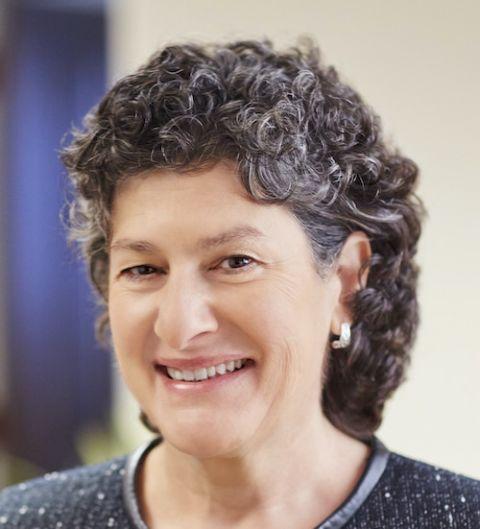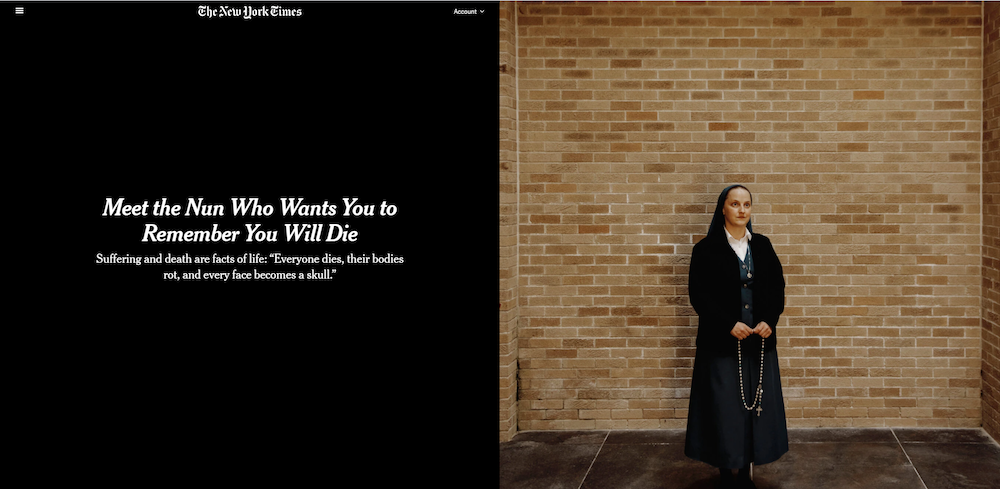A person in front of the Hennepin County Government Center in Minneapolis reacts April 20, 2021, after former Minneapolis police officer Derek Chauvin was found guilty of second-degree murder, third-degree murder and second-degree manslaughter in the May 2020 death of George Floyd. (CNS/Reuters/Carlos Barria)

Editor's note: Global Sisters Report's Monday Starter is a weekly feature from GSR staff writers that rounds up news from or about women religious that you may otherwise have missed.
Tuesday, May 25, is the first anniversary of the murder of George Floyd at the hands of police officers in Minneapolis, Minnesota.
The Sisters of Mercy of the Americas will make their remembrance with prayer and reflection, which can be joined online. The event is organized by the congregation's Institute Office of Anti-Racism and Racial Equity and the Justice Team.
Called "Breathing in Lament: A Memorial for George Floyd," the hourlong event will feature the Rev. Delonte Gholston, senior pastor of Peace Fellowship Church in Washington, D.C., a multi-ethnic, multi-socioeconomic church.
Former Minneapolis police officer Derek Chauvin was found guilty April 20 of murder and manslaughter in Floyd's death, which was recorded on video as Chauvin held his knee on Floyd's neck for more than 9 minutes. Chauvin has not yet been sentenced, and other Minneapolis police officers on the scene that day are awaiting trial.
"In the Book of Genesis, Chapter 2, we see that God breathed into humans and gave us the gift of life," the flyer for the event reads. "On May 25, 2020, in Minneapolis, MN, Mr. George Perry Floyd, Jr. lost his ability to breathe because of racialized police violence."
Floyd's killing, and the viral video of it, sparked protests around the world. The event is meant to remember Floyd's life and mourn his death.
Sr. Mary Haddad appointed to Vatican dicastery on human development
There's another woman's voice in the Vatican.

Mercy Sr. Mary Haddad, president of the Catholic Health Association (Courtesy of CHA)
Mercy Sr. Mary Haddad, the president and CEO of the Catholic Health Association, has been appointed by Pope Francis to membership in the Dicastery for Promoting Integral Human Development, which focuses on health care, immigration, charitable works and climate change.
The dicastery was created in 2017 and is headed by Cardinal Peter Turkson. Members are selected from around the world to represent the various fields the office deals with; Haddad represents Catholic health care in the United States.
Other American dicastery members include Sr. Sheila Kinsey of the International Union of Superiors General, a member of the Franciscan Sisters, Daughters of the Sacred Hearts of Jesus and Mary and a driving force behind Sowing Hope for the Planet; Bishop Robert McElroy of San Diego, California; and Sean Callahan, president and CEO of Catholic Relief Services.
"I am honored to serve on the board of this important Vatican office and look forward to representing our health care ministry," Haddad said in an April 28 statement announcing the appointment.
Grant brings affordable, sustainable hot water to Nairobi provincial house
In 2016, Sr. Susan Nderi of the Missionary Sisters of the Precious Blood in Kenya graduated from the African Sisters Education Collaborative's Higher Education for Sisters in Africa program with a diploma in leadership and resource management.
The congregation runs a home that serves 200 street children, an orphanage, a home for leprosy patients, and homes for the elderly in Kenya and Tanzania. But a survey and financial analysis showed the provincial house in Riruta, Nairobi, was spending much of the congregation's income on heating water for residents, who include about 60 elderly and ill sisters.
Nderi knew solar energy would not only save the congregation money but also would be sustainable. So she used the skills she learned in the ASEC program to apply for a grant to convert the facility's hot water system.
"Solar energy is a truly renewable energy source and is available every day," Nderi said. "We cannot run out of solar energy, unlike other sources of energy ... it is also an alternative for fossil fuels since it is non-polluting, clean and reliable."
According to the United Nations sustainable development goals' 2018 progress report on goal No. 7, affordable and clean energy, only 47% of the sub-Saharan Africa population has access to electricity.
The grant was awarded, the provincial house now uses solar energy to heat their water, the congregation is saving money, and Nderi is pursuing a degree in commerce at the Catholic University of Eastern Africa.
Advertisement
New York Times profiles memento mori sister
Sr. Theresa Aletheia Noble of the Daughters of St. Paul is getting more press.
Noble is known for her Twitter account, where she writes daily about the ancient Christian practice of memento mori, or contemplating one's own death, and for keeping a skull on her desk to help remind her. She was recently featured in this space with the news of her upcoming book, Memento Mori: An Advent Companion on the Last Things, due out in October.
Less than three weeks later, she was profiled in The New York Times.
The Times piece details how she came to be the seeming banner-carrier for memento mori and how the Pauline Sisters, as her congregation is known, have embraced modern media, including social media platforms, with Noble often on the forefront.
The Paulines' online bookstore sells Noble's memento mori prayer book, journal, Lenten devotional, and stickers; the Times says her books are among the order's bestsellers.
The COVID-19 pandemic has claimed nearly 600,000 lives in the United States so far and 3.4 million deaths worldwide, so contemplating death has taken on a new resonance, and Noble now has nearly 47,000 followers on Twitter.

The New York Times profiled Pauline Sr. Theresa Aletheia Noble on May 14. (GSR screenshot)
According to the Times: "In October 2018, on her 455th day with the skull on her desk, she wrote, 'Everyone dies, their bodies rot, and every face becomes a skull (unless you are incorrupt).' " That has been all too easy to see during the pandemic.
Somehow, even as it seemed death itself was walking the Earth, memento mori brings comfort instead of fear, solace instead of panic.
As Noble told Global Sisters Report in 2018: "It's not made me serious and morbid. It's made me detached and joyful. Facing that fear and walking through it releases a lot of emotional energy that's able to be focused on other things. I think that's one of the reasons the saints have recommended it for centuries."
Pauline Sisters get TikTok 'Tricky'
Speaking of the Pauline Sisters, the Times story on Noble gives an example of the order's embrace of whatever modern media comes along to help them spread the Gospel: a TikTok video the congregation posted in December featuring a half-dozen sisters making "tricky" choices between things like morning prayer and evening prayer or the rosary and the Divine Mercy Chaplet.
The video is set to Run D.M.C.'s "It's Tricky" and has been viewed more than 4 million times. The last choice the sisters make in the video is between St. Peter and St. Paul.
Do we even have to tell you who the unanimous choice was?







